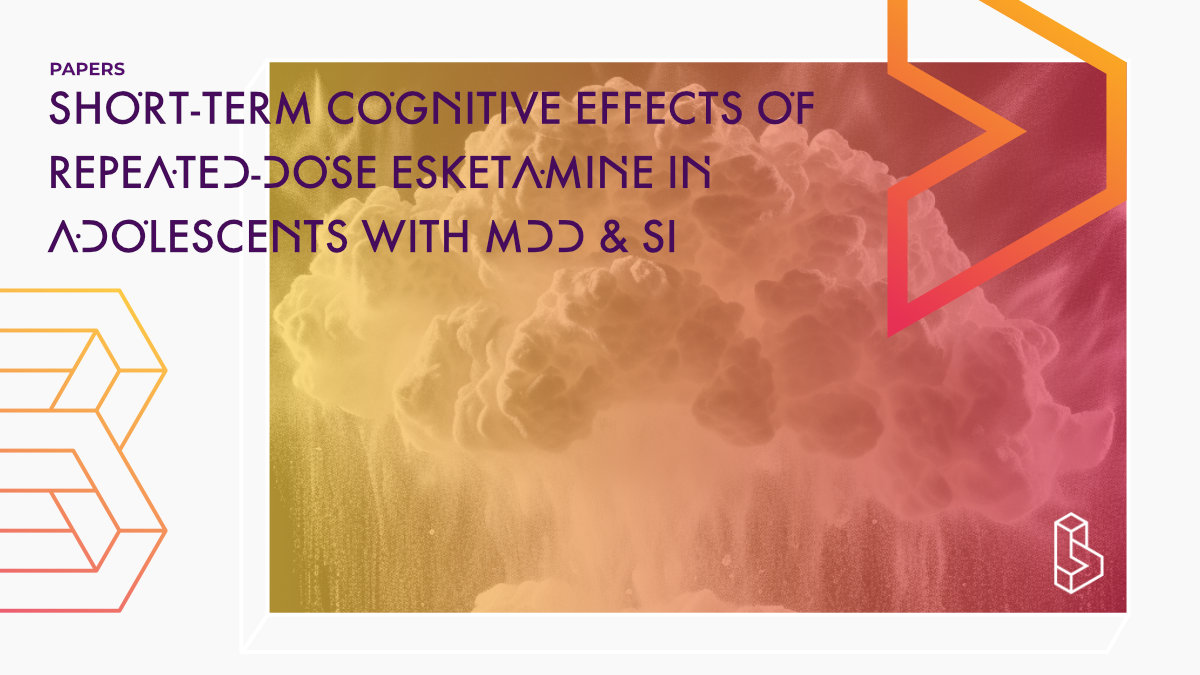This randomized-controlled trial (n=51) assessed the short-term effects of three subanesthetic esketamine infusions (17.5mg/70kg) in adolescents aged 13–18 with major depressive disorder (MDD) and suicidal ideation. The study found a significant improvement in processing speed and working memory in the esketamine group from baseline to days 6 and 12, with no harm to cognition observed. However, there was no significant association between baseline cognition and the antidepressant or antisuicidal effects of esketamine.
Abstract of Short-term cognitive effects of repeated-dose esketamine in adolescents with major depressive disorder and suicidal ideation
“Background: Ketamine and its enantiomer have rapid and robust effects on depressive symptom and suicidal ideation. Little is known about their cognitive effects in adolescents. We aimed to evaluate the short-term effect of esketamine on cognition in adolescents with major depressive disorder (MDD) and suicidal ideation.
Method: In this randomized-controlled trial, 51 participants aged 13–18 with MDD and suicidal ideation received three intravenous infusions of either esketamine (0.25 mg/kg) or midazolam (0.02 mg/kg). Four dimensions of the MATRICS Consensus Cognitive Battery (MCCB), including processing speed, working memory, verbal learning and visual learning, were assessed at Days 0, 6 and 12.
Results: In the linear mixed model, a significant time main effect (F = 12.803, P < 0.001), drug main effect (F = 6.607, P = 0.013), and interaction effect (F = 3.315, P = 0.041) was found in processing speed. Other dimensions including working memory and verbal learning showed significant time main effect (all P < 0.05), but no significant drug or interaction effect (all P > 0.05). Esketamine group showed improvement in processing speed from baseline to Days 6 and 12, and working memory from baseline to Day 12 (all P < 0.05). The generalized estimation equation showed no significant association between baseline cognition and antidepressant or antisuicidal effect (both P > 0.05).
Conclusions: The present study suggested that three-dose subanesthetic esketamine infusions did not harm cognition among adolescents with MDD and suicidal ideation. Instead, esketamine may be associated with improvement in processing speed.
Authors: Xiaofeng Lan, Chengyu Wang, Fan Zhang, Haiyan Liu, Weicheng Li, Yanxiang Ye, Zhibo Hu, Siming Mai, Yuping Ning & Yanling Zhou
Summary of Short-term cognitive effects of repeated-dose esketamine in adolescents with major depressive disorder and suicidal ideation
Ketamine, an N-methyl-d-aspartate (NMDA) receptor antagonist, is used in the induction and maintenance of anesthesia and for the treatment of depression and suicidal ideation.
Ketamine is safe and effective in treating depression in adult population, and several small open-label trials have been conducted in adolescents. These trials suggest that ketamine is an effective and safe treatment for this adolescent population.
Concerns about ketamine’s adverse reactions in adolescents will persist until larger studies can demonstrate that it is safe enough for this population. However, adult data is inconsistent with findings that repeated intravenous ketamine or its enantiomer would harm cognitive function in adolescents. In our previous open-label study and in long-term studies conducted in large samples, ketamine improved verbal learning and processing speed and partly independent of improvements in depressive symptoms. There were no severe and persistent cognitive impairments in depressed adults treated with ketamine.
Find this paper
https://doi.org/10.1186/s13034-023-00647-2
Open Access | Google Scholar | Backup | 🕊
Cite this paper (APA)
Lan, X., Wang, C., Zhang, F., Liu, H., Li, W., Ye, Y., ... & Zhou, Y. (2023). Short-term cognitive effects of repeated-dose esketamine in adolescents with major depressive disorder and suicidal ideation: a randomized controlled trial. Child and Adolescent Psychiatry and Mental Health, 17(1), 1-10.
Study details
Compounds studied
Ketamine
Topics studied
Adolescence and Psychedelics
Depression
Suicidality
Study characteristics
Placebo-Controlled
Double-Blind
Within-Subject
Randomized
Participants
51
Humans
Linked Research Papers
Notable research papers that build on or are influenced by this paper
Effect of Repeated Intravenous Esketamine on Adolescents With Major Depressive Disorder and Suicidal Ideation: A Randomized Active-Placebo-Controlled TrialThis placebo-controlled trial (n=54) investigates the efficacy and safety of esketamine (iv, 17.5mg, 3x) in adolescents suffering from depression (MDD) and suicidal ideation (SI). It shows significant reductions in Columbia Suicide Severity Rating Scale (C-SSRS) Ideation and Intensity scores and Montgomery–Åsberg Depression Rating Scale (MADRS) scores in the esketamine group compared to the midazolam (placebo) group at day six, with maintained antisuicidal and antidepressant responses at four weeks post-treatment.

